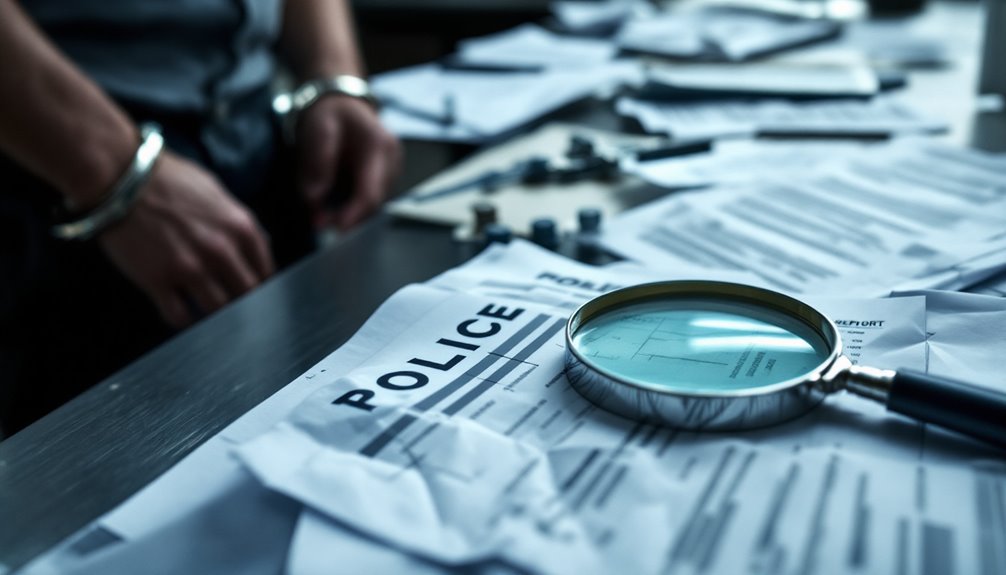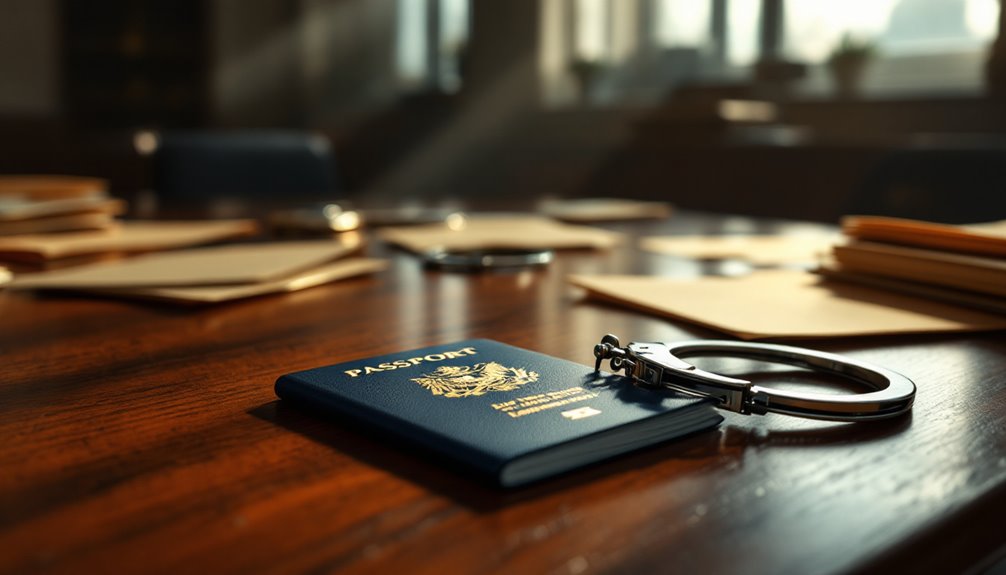After an arrest, common legal mistakes include speaking to police without an attorney, leading to self-incrimination. People might resist arrest physically or verbally, causing extra charges. They often ignore their rights and fail to document the arrest properly. Delaying legal help can complicate matters, as can missing court dates or breaching bail conditions. Ignoring bail reduction options, discussing the case on social media, and overlooking immigration risks also create problems. Explore further to safeguard your rights.
Key Takeaways
- Talking to police without legal counsel increases the risk of self-incrimination and misinterpretation of statements.
- Resisting arrest can result in additional charges and negatively impact future legal outcomes.
- Ignoring or not knowing your rights and failing to document the arrest can jeopardize the case.
- Delaying in seeking legal representation can lead to missed opportunities and increased stress.
- Underestimating the seriousness of charges and neglecting bail reduction can lead to unnecessary detention and long-term consequences.
Talking to Police Without Legal Counsel

Why should one avoid talking to police without legal counsel? Speaking to police without an attorney can lead to waiving essential legal rights. These include Miranda rights, like the right to remain silent. The Fifth Amendment protects against self-incrimination, but without legal counsel, individuals might unknowingly give away incriminating information. Police can use tactics such as lying or false promises to obtain statements. These statements can be misinterpreted or taken out of context, becoming evidence against the person in court. An attorney helps to navigate these risks and guarantees that statements are clear. In criminal defense, an attorney's presence is critical to protect rights and maintain a fair legal process. Refusing to speak without an attorney is a wise choice.
Resisting Arrest or Escalating the Situation

After understanding the importance of legal counsel during police interactions, it's also important to weigh the risks of resisting arrest or escalating the situation. Resisting arrest, whether physical or verbal, can lead to severe consequences. Physical actions like struggling or fleeing might result in extra charges and complicate one's case within the criminal justice system. Verbal resistance, such as offensive language, can also escalate tensions and worsen outcomes. These actions can lead to fines, imprisonment, or a permanent criminal record. This can affect employment and housing opportunities. Understanding legal rights is essential. Resisting arrest can complicate legal proceedings and increase penalties. It is imperative to remain calm and seek legal counsel to navigate these challenging situations effectively.
Failing to Document the Arrest Process

Documenting the arrest process is essential for protecting one's legal rights. Many people fail to gather important details after an arrest. This mistake can harm their case later. Legal advice often stresses the need to document the arrest. This includes noting the date, time, and location of the arrest. Recording officers' names and badge numbers is critical. Witnesses' contact information should also be collected. Preserving physical evidence is key. Photographs of injuries and damaged property should be taken. Items like clothing must be kept safe. Video footage of the incident can be useful but must follow legal guidelines. Official records, like incident reports, are also important. These steps help guarantee a fair legal process.
Ignoring or Not Knowing Your Rights

Understanding and exercising one's rights after an arrest is crucial. Many people make the mistake of ignoring their right to remain silent. Speaking during an arrest can lead to self-incrimination. Words said can be used as evidence in court. Another common error is not using the right to an attorney. An attorney can protect rights and guide through legal processes. Without one, misunderstandings can occur. Ignoring bail conditions can also complicate the situation. Here are common consequences of ignoring these rights:
- Self-incrimination: Speaking can harm one's case.
- Lack of legal guidance: Without an attorney, handling law is hard.
- Legal missteps: Misunderstanding rights can lead to errors.
- Worsened legal outcomes: Ignoring rights can complicate defense.
Missing Court Dates or Ignoring Bail Conditions

Missing a court date or ignoring bail conditions can lead to severe legal consequences. A bench warrant may be issued for the individual's arrest. This warrant allows police to arrest them anytime, anywhere. Missing court dates can also result in fines and bond forfeiture, causing financial hardship. It could lead to additional criminal charges like contempt of court. This complicates the original case and may result in harsher penalties. Ignoring bail conditions can mean staying in custody until trial. Missing court dates might even cause a driver's license suspension. These actions can impact future legal matters and lead to employment and housing issues. It is crucial to act quickly and seek legal help to address a bench warrant and reschedule missed court dates.
Delaying in Seeking Legal Representation

Delay in seeking legal representation can lead to substantial pitfalls. Individuals who neglect to seek legal counsel may face severe consequences. Delaying legal representation often results in lost time, increased penalties, and emotional stress. By ignoring court orders and legal obligations, the accused risk worsening their situation.
- Lost Opportunities: Time-sensitive evidence disappears, reducing the chance of a favorable outcome.
- Harsher Penalties: Without timely guidance, penalties and fines can increase markedly.
- Emotional Turmoil: Prolonged uncertainty causes stress and anxiety, affecting personal relationships.
- Financial Losses: Ignoring the need for legal help can lead to long-term financial repercussions.
Acting swiftly to secure legal support can mitigate these risks, ensuring a more favorable resolution to legal challenges.
Making Unintentional Self-Incriminating Statements

Individuals often make unintentional self-incriminating statements after an arrest. Casual conversations with police can lead to such statements. People may admit to being at the crime scene or knowing the victim. Even informal chats can be used in court. Law enforcement might use a friendly demeanor to gather information. Social media posts and electronic communications are also risky. They can reveal timelines or contradict court statements. Friends and family discussions can be overheard or reported. These conversations sometimes lead to self-incrimination. During interrogations, volunteering information can harm one’s defense. It is essential to seek legal counsel immediately. Speaking without an attorney present can be as risky as resisting arrest, leading to more complications in legal proceedings. Therefore, it is crucial for individuals to understand the potential consequences of their words. Always remember, “never admit anything to police,” as seemingly innocent remarks can be twisted and used against you. Maintaining silence and seeking a lawyer’s advice is the best strategy to protect one’s legal rights and ensure a fair defense.
Not Collecting Evidence or Witness Information

Failing to gather evidence or witness information can seriously weaken a defense. When someone is arrested, not collecting evidence can lead to major issues. Witnesses play a pivotal role. Their statements can support the defense's story. Physical evidence is equally important. Items like photos or videos can be key. If these are not preserved, they may be lost forever.
Here are some reasons why gathering evidence is essential:
- Missing Witnesses: Without their names or contact info, they can't testify.
- Lost Physical Evidence: Items not documented might disappear.
- Unrecorded Mistreatment: Any misconduct by police may go unchallenged.
- Ignored Electronic Evidence: Digital proof, like messages, may be deleted.
Acting quickly to secure evidence can make all the difference.
Not Reviewing the Police Report for Discrepancies

After an arrest, reviewing the police report is vital to identify any key inconsistencies. These inconsistencies can challenge the accuracy of the report and affect the outcome of a case. A thorough review can reveal errors that may weaken the prosecution's arguments.
Identifying Key Inconsistencies
Many overlook the importance of reviewing police reports carefully after an arrest. Key inconsistencies, such as incorrect names or dates, can have a significant impact. Individuals often make mistakes by speaking without legal counsel, resisting arrest, or failing to document the incident. These errors can lead to severe consequences. Recognizing discrepancies in police reports is essential.
- Factual Mistakes: Wrong license plate numbers or misrecorded arrest scene details can change the case outcome.
- Omissions: Missing evidence details or field sobriety test conditions can weaken defenses.
- Vagueness: Lack of specific facts or ambiguous descriptions can mislead legal proceedings.
- Bias: Subjective interpretations or officer biases can unfairly influence perceptions.
Reviewing reports thoroughly is important for a fair legal process.
Challenging Report Accuracy
Reviewing a police report for discrepancies is essential in legal proceedings. Police reports often contain errors or omissions that impact legal disputes. These inaccuracies can lead to wrongful convictions or acquittals. For instance, a typo or missing detail might cause misunderstandings. In a courtroom, such mistakes can weaken a prosecution's case or bolster a defense. Identifying discrepancies promptly is critical. It can prevent prolonged legal battles and guarantee a fair trial. Defense lawyers often explore these errors to negotiate better plea bargains or seek dismissals. Therefore, carefully examining the police report can change the outcome of a case dramatically. Legal representation must focus on challenging inaccuracies to uphold justice and ethical standards in law enforcement.
Underestimating the Seriousness of Charges

Many people make the mistake of not taking minor charges seriously after an arrest. Even small offenses can lead to severe financial penalties, jail time, and a lasting criminal record. This can harm future job prospects, housing opportunities, and educational paths. Furthermore, failing to address these minor charges can result in escalated consequences that may spiral out of control. For instance, individuals convicted of even minor driving under the influence (DUI) offenses may face house arrest for DUI offenders, which restricts their freedom and complicates their daily routines. By taking every charge seriously and seeking legal guidance, individuals can better navigate the legal system and mitigate the long-term impacts on their lives. Moreover, individuals often underestimate the long-term consequences of these offenses, believing that they will simply fade away with time. However, exploring options such as house arrest alternatives for DUI can provide a more constructive solution while still holding offenders accountable. Taking proactive steps towards rehabilitation not only helps in navigating the legal system but can also mitigate some of the negative impacts on one’s personal and professional life.
Consequences of Minor Offenses
Underestimating the seriousness of minor offenses can lead to unexpected consequences. Many assume small offenses are insignificant, but they can escalate quickly. Even a minor mistake might require intervention from a law firm or public defenders. This is especially true if the situation worsens, leading to potential felony charges. Here are some consequences that could occur: Failing to address minor offenses can create a ripple effect, ultimately resulting in higher legal costs and damaged reputations. Small businesses, in particular, must be vigilant to avoid the top legal errors for small businesses, which often stem from neglecting seemingly trivial issues. By addressing these problems early on, companies can prevent them from spiraling into more serious legal troubles and protect their longevity in the marketplace.
- Detention and Probation: Young offenders may face time in juvenile detention or strict probation terms.
- Fines and Restitution: Financial penalties can burden families, with fines or restitution for damages.
- Community Service and Counseling: Offenders often must complete community service or attend counseling sessions.
- Serious Legal Implications: Severe offenses might lead to adult court transfer, losing juvenile protections.
These consequences highlight the importance of taking all charges seriously.
Impact on Future Opportunities
Failing to grasp the seriousness of criminal charges can drastically alter future opportunities. One of the biggest legal mistakes people make after an arrest is underestimating how charges affect their lives. A criminal record can block career paths. Many professions deny licenses if one has a conviction. Employers often run background checks, making job hunting challenging. Case law shows that convictions can lead to revoked professional licenses. This limits promotions and new job chances. Socially, a criminal record can damage one's reputation. Community stigma may lead to social isolation. Financially, legal fees and fines add stress. Loss of income from incarceration worsens this. Ignoring the gravity of charges can have long-lasting consequences on one's future.
Failing to Prepare for Court Appearances

One common oversight after an arrest is lack of preparation for court appearances. People often fail to gather necessary documents and evidence. They might miss deadlines, which can be damaging. Without preparation, they don't understand the legal process or what will happen in court. This leads to confusion and mistakes.
Poor presentation and communication can also occur. Talking too much or interrupting can be harmful. Being overly emotional can distract from important issues. It's vital to let the lawyer speak and handle the case.
Inadequate attorney preparation can also hurt the outcome.
Consider these emotional impacts:
- Stress from missing document deadlines.
- Confusion about court procedures.
- Embarrassment from poor communication.
- Frustration due to attorney unpreparedness.
Neglecting to Ask for Bail Reduction

Neglecting to ask for a bail reduction can lead to prolonged and unnecessary detainment. A defendant must file a motion with the trial court to request a bail reduction. This motion should detail the current bail amount and explain why the defendant cannot afford it. Once filed, a hearing is scheduled, which might take days or weeks. Presenting a strong case for bail reduction is essential. The court considers factors like the seriousness of charges and the defendant's ties to the community. Evidence, such as pay stubs and testimonies, can be helpful. Timing is vital; a denied request is hard to revisit. Filing promptly during the initial arraignment is advised to avoid missing opportunities for a reduction.
Engaging in Social Media Discussions About the Case

After addressing bail concerns, another significant mistake often occurs online. People talk about their cases on social media. This can cause many problems: Posting details about a legal case can be used as evidence in court and may negatively impact the outcome. This is especially true in high-profile cases, where oversharing can lead to celebrity divorce mistakes that complicate settlements and custody agreements. It’s always best to stay silent online and let legal professionals handle the situation properly.
- Legal Evidence: Posts can be used in court. Even jokes or threats might lead to more charges.
- Public Image: Online discussions can harm a defendant's image. This might affect jury opinions.
- Evidence Destruction: Deleting posts can be seen as destroying evidence. This can worsen the situation.
- Defense Impact: Social media activity might weaken the defense strategy and credibility.
It is vital to be cautious online. Avoid discussing the case on social media. This simple step can prevent extra legal trouble. Always consult a lawyer before posting anything related to the case.
Disregarding Potential Immigration Consequences

Many people overlook how an arrest can affect their immigration status. Even without a conviction, the risk of deportation can increase. Understanding these risks is essential for anyone who is not a U.S. citizen.
Immigration Status Impact
Understanding the impact of criminal charges on immigration status is essential. Many overlook how even minor offenses can affect their future in the U.S. Crimes like DUI or drug-related offenses pose serious risks. Others, such as those involving moral turpitude, have severe consequences.
Ignoring these facts can lead to:
- Broken Dreams – Losing the chance to secure a green card or visa.
- Family Separation – Deportation can tear families apart.
- Lost Opportunities – A criminal record may block U.S. citizenship.
- Unexpected Detention – Minor offenses might lead to ICE custody.
Consulting a criminal defense attorney experienced in immigration law can help. Quick legal action is important to minimize risks. Understanding specific laws can protect against unintended outcomes.
Deportation Risk Awareness
Immigration charges can have severe consequences beyond the immediate legal implications. Many people underestimate the risk of deportation. Programs like Secure Communities increase these risks. They have led to over 450,000 deportations without lowering crime rates. Deportation can break families apart and cause job loss and mental distress. Policies often ignore the community ties of individuals, worsening their impact. In 2024, deportations rose nearly 70% compared to 2023. ICE focuses on individuals with criminal records or immigration law violations. Deportation processes are legally complex and costly. They can cost the U.S. billions annually and result in financial losses for those affected. People facing these risks should be informed and prepared to navigate potential legal challenges.
Not Considering Plea Bargain Options

Failing to take into account plea bargain options can substantially impact a defendant's legal strategy. Ignoring these options might lead to severe consequences. Plea bargains offer a chance for reduced penalties and can save time and costs associated with a trial. They can also bring certainty to an uncertain situation.
Possible outcomes of not considering plea bargains include:
- Harsher Sentences: Defendants risk receiving harsher penalties if found guilty at trial.
- Increased Costs: Trials are costly and time-consuming for defendants and the legal system.
- Civil Rights Impact: Convictions, whether from trial or plea, affect civil rights equally.
- Missed Opportunities: Avoiding plea deals might miss chances for a lighter sentence or charge reduction.
Considering a plea bargain is essential.
Frequently Asked Questions
What Should I Do if I Am Arrested in a Foreign Country?
When arrested in a foreign country, one should stay calm and cooperative. It is essential to ask for a lawyer familiar with local laws. Request consular notification to inform the home country's embassy. Keep communication clear and respectful with authorities. Avoid making statements without legal advice. Document all interactions and seek help from consular officials. Understanding local procedures and rights can aid in managing the legal process effectively.
How Can I Find a Reputable Defense Attorney Quickly?
In the digital age, finding a reputable defense attorney quickly is vital. One should start by asking friends or family for recommendations. Professional networks and support groups are valuable resources too. Online directories like Super Lawyers can help identify top attorneys. Checking bar associations is wise to verify credibility. It's important to research an attorney's background, experience, and costs. Preparing questions for consultations helps in making an informed decision.
Can I Request a Different Public Defender if I'm Unsatisfied?
An individual can request a different public defender if unsatisfied with their current one. The process involves submitting a written request to the court and providing evidence of inadequate representation, like missed deadlines or poor communication. It's up to the court to approve the change, and generally, only one request is permitted. If denied, other options include hiring a private attorney or addressing the issues directly with the current defender.
What Are My Options if I Can't Afford Bail?
In the digital age, when someone can't afford bail, they face several choices. They might seek release on their own recognizance, promising to appear in court. A bail reduction hearing could lower the amount. Pretrial services offer supervised release. Nonprofit bail funds may help financially. Public defenders can assist with options. Without bail, incarceration continues, affecting income and family. Understanding these options is vital for a defendant's course of action.
How Do I Handle Media Inquiries About My Arrest?
When handling media inquiries about an arrest, one should be cautious. Saying "No comments" is acceptable to protect privacy. It's recommended to have a witness during any media interviews and to focus on factual corrections without using defensive language. Reducing media exposure, such as limiting social media use, is advised. If misinformation arises, politely request corrections. Hiring a PR professional can be helpful in managing media interactions effectively.
Conclusion
In the aftermath of an arrest, informed decisions can make all the difference. Speaking to police without counsel, resisting arrest, or missing court dates can complicate matters. Ignoring rights, neglecting bail options, and discussing the case online can lead to further issues. Disregarding immigration consequences and overlooking plea bargains can have lasting effects. By understanding these pitfalls, individuals can navigate the legal system more effectively, minimize risks, and safeguard their future. Knowledge empowers, and preparation protects.
